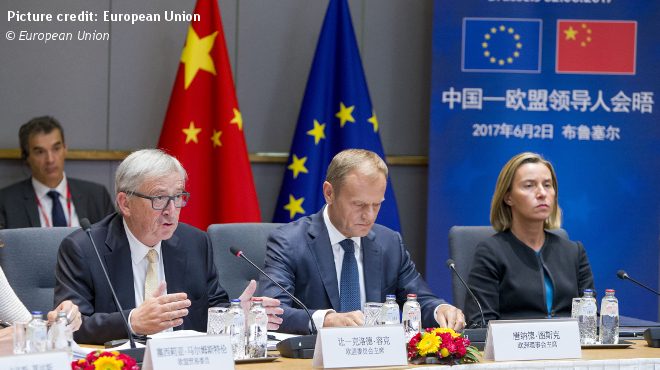China and Europe’s Investment Clash

Invest in Europe
This month, the European Commission began to draft a proposal designed to constrain Chinese investment in Europe. This comes at a time when the EU is playing a major role in the future of the Chinese economy. The EU is now the principal recipient of Chinese foreign investment. In 2015, China’s investment in European countries exceeded USD 30 billion, double the amount invested in the United States. In 2016, Chinese investors spent more than the last 10 years combined on acquisitions and investments in Europe.
But, why are Chinese firms investing so heavily and why are some EU members resisting?
Global China
A key driver to invest in Europe is China’s stagnate wages and greater cost competition. These factors have pushed Chinese firms to produce high technology goods which require the R&D that European firms offer.
Another reason is that Chinese State-Owned Enterprises (SOEs) are currently afflicted by a serious problem of overcapacity which they are endeavouring to counterbalance. This problem is rife in industries such as steel and cement production. For example, China used as much cement (6.6 gigatons) between 2011 and 2013 as the United States used during the entirety of the 20th century, while China’s current steel industry output is double that of Japan, India, the United States and Russia combined. China now has all the installed capacity, but demand is limited due to both a slow-down in domestic activity and external demand.
An additional problem arises in the form of these companies’ scant productivity and capacity to generate profits; the return on assets ratio of Chinese SOEs is just 33% that of private firms and 50% that of foreign companies. There is also a low debt-to-equity ratio of Chinese firms which makes many SEOs barely sustainable. In the event that these firms fail, China’s economy will buoyed by firms who hold stakes in overseas high tech businesses.
Chinese ‘Buyouts’
There are a few reasons why some in the EU are against Chinese takeovers and the immense amount of foreign investment.
First, there is a perception that there is a lack of reciprocity between China and the EU. Put simply, European firms find it difficult to compete with Chinese firms on their home soil. Analysts for the Financial Times stated in January that, “Chinese interest is growing rapidly in sectors that remain restricted to foreign investors in China, which has further amplified the political salience of unequal market access.” A recent survey revealed that “nearly half of EU firms said it got harder to conduct business in China last year.”
Second, China is plagued with an image problem. Western media often stereotype Chinese companies for being low quality, and as proxies of the Chinese government who are only interested in stealing knowledge. Some European nations are strengthening domestic regulations when it comes to foreign buyouts. Last month, Germany broadened its powers to prevent the buyout of domestic firms by foreign investors. The new directive allows ministers to investigate buyouts of companies which operate critical infrastructure.
Dispelling the Stereotypes
However, new research by Fang and Chimeson has questioned the validity of these stereotypes. Using the case of the Chinese firm Geely and their acquisition of Volvo Cars in Sweden the researchers looked into the phenomenon of negative media attention. What they found is that Western media’s reports were mostly not based in fact, and were guided by fear spread by conservative European politicians. Indeed, Geely’s acquisition of Volvo in 2010 was roundly criticised until Geely was able to prove its mettle by 2013 turning Volvo’s losses into profits. Indeed, Geely outperformed the previous American owner. Now, the latest figures released by Geely show that sales have risen 6.2% yr/yr in July.
While the media may take some time to come around, Chinese firms must work on public opinion through better marketing and advertisements. Due to the heavy interference of the Chinese state into public and private enterprise, the state also has a role in dispelling its image of being closed to outside and European influence and interaction.
There is a failure on the part of Chinese policymakers to present a viable soft image of China to the West. Just one company like Geely will hardly be able to change a strongly held stereotype without a national effort. From this example there is some scope to suggest that Chinese business practices may be more competitive and efficient than Western ones, but it is difficult to say if this will be a trend.
China has some traits that it can play to its advantage. It has no colonial history beyond its current borders, and no history of war in nearly 40 years. In a turbulent world, China’s leadership appears relatively stable and predictable. Chinese firms should sell the same package. Furthermore, Chinese businesses have an ace up their sleeve – Europe needs Chinese investment to boost its economies.
On September 13, EU Commission President Jean-Claude Juncker will reveal Europe’s foreign investment regulations with an eye to restrict Chinese investment. Only then will it become clear how the EU aims to negotiate the tricky path of simultaneously appeasing and constraining China.